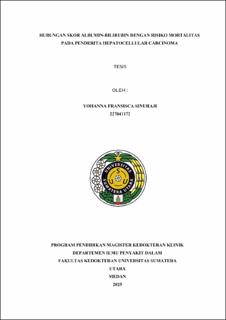Hubungan Skor Albumin-Bilirubin dengan Risiko Mortalitas pada Penderita Hepatocellular Carcinoma
The Association between the Albumin-Bilirubin Score and the Risk of Mortality in Patients with Hepatocellular Carcinoma

Date
2025Author
Sinuhaji, Yohanna Fransisca
Advisor(s)
Sungkar, Taufik
Ilhamd
Metadata
Show full item recordAbstract
Introduction: Hepatocellular carcinoma (HCC) is one of the most prevalent forms of primary liver malignancy and is associated with a high global mortality rate. The underlying hepatic dysfunction that often accompanies HCC significantly contributes to the development of severe complications and increased risk of death. The Albumin-Bilirubin (ALBI) score, a laboratory-based assessment tool, provides a simplified and objective evaluation of liver function, and has been proposed as a potential prognostic indicator of mortality in patients with HCC. This study aims to evaluate the association between ALBI score and mortality risk in HCC patients. Method: This study employed an analytical retrospective cohort design conducted at H. Adam Malik General Hospital, Medan, from September 2024 to April 2025. Data were collected from medical records of adult patients (>18 years) diagnosed with hepatocellular carcinoma (HCC) who had received treatment and had complete clinical and laboratory data available. The ALBI score was calculated using serum albumin and bilirubin levels, and subsequently categorized into three grades: ALBI grade I, II, and III. Patients were followed until a definitive clinical outcome (survival or death) was reached, and the association between ALBI score and mortality was analyzed.
Result: A total of 135 patients met the inclusion and exclusion criteria. A higher proportion of mortality was observed among patients with ALBI grade II and III compared to those with grade I. There was a statistically significant association between higher ALBI scores and increased risk of mortality in patients with HCC (p<0.05).
Conclusion: Higher ALBI scores are significantly associated with an increased risk of mortality in patients with hepatocellular carcinoma. Therefore, the ALBI score can be used as a simple and objective prognostic assessment tool in clinical practice to support the management decisions of hepatocellular carcinoma patients.
